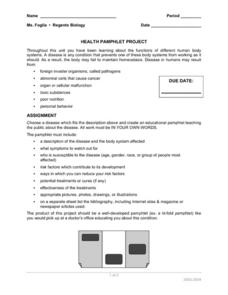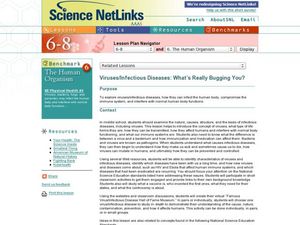Curated OER
Regents High School Examination: Living Environment 2003
The living environment, from the interior of a cell to the complex relationships among populations, are queried in this final examination. Learners look at air pollution maps, diagrams of cells, population graphs, and drawing of cells....
Curated OER
Regents High School Examination: Living Environment 2005
The 2005 version of the Regents High School Examination in the area of ecology is as comprehensive as previous years' exams. It consists of 40 multiple choice questions on everything from the structure of DNA to the interactions within...
Curated OER
Regents High School Exam: Living Environment 2008
Tne New York Regents High School Examinations are comprehensive and include various styles of questions, includingmultiple choice and the analysis of graphs. This particular version, the 2008 Living Environment exam surveys a variety of...
Smithsonian Institution
Vaccines! How Can We Use Science to Help Our Community Make Decisions about Vaccines?
Uncover the fascinating world of vaccines in a multifaceted activity. Investigators explore community perception and the science of vaccines with eight tasks. Scientists continue their studies by giving and reviewing surveys, analyzing...
Exploratorium
Antibody Attack - Discover How Antibodies Launch Attacks on Invaders
Jump into the action and help antibodies defend against an antigen attack! Investigators match antibodies with antigens to model the body's identification and recall of specific pathogens. Young biologists also recognize that each...
Children’s Hospital of Philadelphia
Discovery and Development of Vaccines
Stop the spread. Pupils work through two activities to gain an understanding of vaccines and immunity. Learners research different types of vaccines and how they are made and explore the advantages and disadvantages of them. Using a...
Children’s Hospital of Philadelphia
Development of Disease and Infection
It's all in the cards. Using cards to simulate a disease's attack on the immune system, pupils develop an understanding of how the immune system and pathogens react to each other and why at times the pathogen wins. Groups play a game to...
Howard Hughes Medical Institute
Cells of the Immune System
You won't be able to resist the content of a great presentation! Young immunologists discover the variety of cells involved in keeping our bodies free from pathogens with a resource that contains both slides and video clips. The included...
Howard Hughes Medical Institute
Ebola: Disease Detectives
How did the Ebola virus first infect humans? Young virologists examine genetic sequences from the 2014 Sierra Leone outbreak to find similarities during a riveting activity. Following similar methods used by MIT and Harvard, partners...
Howard Hughes Medical Institute
Viral DNA Integration
How do viruses hijack our cells to produce more viral particles? Junior immunologists model how viral RNA integrates into a host cell's DNA using pop beads and use interactive tools to explore a virus' genome. The teacher's guide...
Ask A Biologist
Viral Attack
Can you catch the same cold twice? Elementary and middle schoolers learn about what happens when a virus attacks their bodies, and how the immune system never forgets a virus, with an entertaining comic book. The packet includes...
Explore Biology
Health Pamphlet Project
Biology or health nuts select a disease to research and produce a pamphlet that can be used to inform the public. The tri-fold product is worth 100 points according to the included grading page.
Scholastic
Study Jams! The Immune System
A set of slides depicts sick children, an artistic rendition of a white blood cell amongst red blood cells, and a diagram of part of the lymph system to teach youngsters about immunity. Kids will find that it is made up of skin, white...
Baylor College
Defending Against Microbes
In the preceding activity from the unit, beginning biologists discovered that microorganisms are everywhere, so the question follows, why are we not sick all of the time? Class members read and discuss an article in small groups about...
Curated OER
Immune System
Defense mechanisms, the lymphatic system, antibodies, and allergy are all topics addressed in this immunity worksheet. Although designed as a chapter review for a specific text, it can be used as a unit review for any class in which you...
Curated OER
Biology Jeopardy
Play Jeopardy as you review what might possibly be an entire year's high school biology course! The vast variety of questions requires that you read through the slides to make sure that they all relate to your curriculum. You could make...
Curated OER
Immune, Lymphatic System
A fantastic slideshow that has images, details, definitions and trivia to accompany each structure and response involved with the immune system. The slides are very useful for all levels of the immune response. A complete sets of notes...
Children’s Hospital of Philadelphia
Case Studies: Influenza and HIV
Stop infection spread. Pupils participate in an activity to model infections and replications of viruses. Within the activity, scholars see that viruses may end up with genetic variation and connect that to how some forms of the flu are...
Curated OER
Viruses/Infectious Diseases: What's Really Bugging You?
Middle school life science or health classes listen to an audio, visit websites, read different articles, and participate in a class-wide simulation about the spread of viruses. The lesson doesn't get into the mechanics of how viruses...
Curated OER
ABO Blood Types Worksheet
Blood types and transfusions are explained in reading passages at the top of the worksheet. A chart of blood type compatibility is also provided. Biology students answer comprehension questions and then exercise critical-thinking skills...
Curated OER
Allergy: A Modern Epidemic
In this allergies worksheet, 7th graders 6 paragraphs about the topic, then answer 12 questions about the passage, complete a table with verbs and nouns from the text, work on 12 sentences and discuss 4 questions with a partner (glossary...
Curated OER
Using Mathematics to Explain the Spread of Diseases
Students use statistics to solve problems based on the spread of disease. In this disease lesson students study the role that viruses and bacteria play in the spread of diseases and explain pandemics.
Curated OER
Fizzies Virus
Sixth graders discover how disease spreads. In this disease control lesson, 6th graders brainstorm a list of diseases and simulate how a disease spreads by using cups of hydrogen peroxide and water. Students create the "Fizzies Virus"...
Curated OER
Fighting Back!
Fifth graders inspect the basic functions of the immune system and determine how viruses and bacteria invade the immune system. They also explore what happens to the immune system in outer space.

























